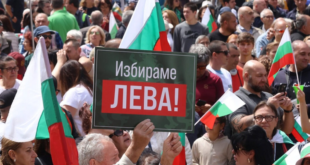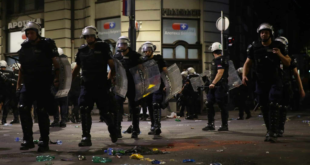PRISTINA, Serbia – After a decade struggling to prove it deserves independence, Kosovo’s hardest task is still ahead: proving it can afford it.
The Albanian-majority province is expected to secede from Serbia on Sunday and proclaim itself the world’s newest state, after nearly nine years as a U.N. protectorate.
It is still weighed down by the destruction of the 1998-99 war and the failed expectations of international stewardship since.
Landlocked, poor and bereft of much industry, its hopes lie in its mineral wealth — mainly lignite coal — and the energy of its 2 million people, the youngest population in Europe.
“Only now will Kosovo go through a real transition,” said Akan Ismaili, head of IPKO telecom, Kosovo’s most successful local start-up. “All these years under the U.N. were not transitional years, they were keep-the-status-quo years.”
“Now we must catch this momentum, this optimism created by independence, to get investment from abroad but also get internal investment going.”
When the West took over in 1999, Kosovo was a mess.
Roads, factories and utilities — already neglected in the 1990s after nationalist Serb autocrat Slobodan Milosevic revoked the impoverished province’s autonomy — had been destroyed in the fighting between ethnic Albanian guerrillas and Serb forces, or in the NATO bombing that expelled Serb troops.
There were none of the gleaming shopping centers, car dealerships and design-conscious cafes that now line the streets of the capital Pristina, full of chattering 20-somethings.
Next to the stubborn potholes and power cuts, it’s a mixed picture. The prosperity is real, but superficial, fuelled by donor aid and remittances, say economists, and the focus must change from consumption and imports to production and exports.
“Kosovo will likely not be economically self-sustainable for some time in the future,” said Jens Bastian, economist at the European Agency for Reconstruction, which has channeled over a billion euros (dollars) of European Union funds into Kosovo.
“The international community has to be clear that once status has been settled, assistance requirements will not go away, but they will become much more prominent.”
In two to three years time, Kosovo “will be struggling”, he said. “We are at least one generation away from a self-sustainable economy, I do not see a rush to prosperity in the next 5-10 years.”
HUMAN CAPITAL
In the marketplaces and scrap heaps around the capital, fear of the future is taking the shine off independence.
“Business is going down, there is no metal left,” says Mehdi Hajdari, one of the hundreds working in dozens of small businesses providing Kosovo’s main export: scrap metal, mainly to neighboring Albania.
He points to the crusher, which compresses fridges, old cars and bits of construction material into neat cubes: “In the end, we’ll have to send the machine itself for scrap.”
Among official circles, plans have been drawn for years with the day after in mind. Finance Minister Ahmet Shala dismisses doubts about sustainability, pointing to similar-sized success stories in the neighborhood, such as Slovenia and Montenegro.
“Kosovo’s natural advantages are its underground resources, and its people. With an average age of 25 years, our population is the youngest in the region, very motivated and an excellent natural resource for the whole of Europe,” he says.
The government hopes to fight the 50 percent unemployment rate and boost skills by setting up targeted labor-exchange programs with EU countries, supplying at lower cost the skills that Europe needs, what Shala calls a “win-win situation”.
However, some of western Europe is already having problems dealing with an influx of workers from poorer eastern neighbors who have the major advantage of already being EU members.
The Pristina government also points to Kosovo’s natural resources as the backbone of development.
A planned new mine would take Kosovo’s 14 billion tonnes of lignite reserves and use it to fuel a new 2,000 MW power plant, in a 3.5 billion euro public-private partnership project aimed at solving the energy problem and securing steady revenue.
“From 2015, we will have sufficient energy for ourselves and be an exporter,” said Lorik Haxhiu, special advisor to the Ministry of Energy and Mining.
“One stream of income would be royalties from the mining of lignite. Lower power prices will attract investors, and we’ll also be looking for profit-sharing from exports.”
Officials hope that a wave of recognitions, mainly from the EU and United States, will raise the new state’s profile, giving it the legitimacy it needs to attract loans and investors who have been put off so far by Kosovo’s limbo status.
It should also end an era of political infantilism as a ward of the West and put Kosovo’s people in the driver’s seat.
“Local institutions, even though elected, have often failed to take responsibility on very crucial issues, such as drafting a development strategy,” says Mimoza Kusari-Lila, head of the American Chamber of Commerce in Kosovo.
“Our achievements should not stop at the declaration of independence, they cannot stop until Kosovo is a normal, functioning state with no need for supervision.”
 Eurasia Press & News
Eurasia Press & News



